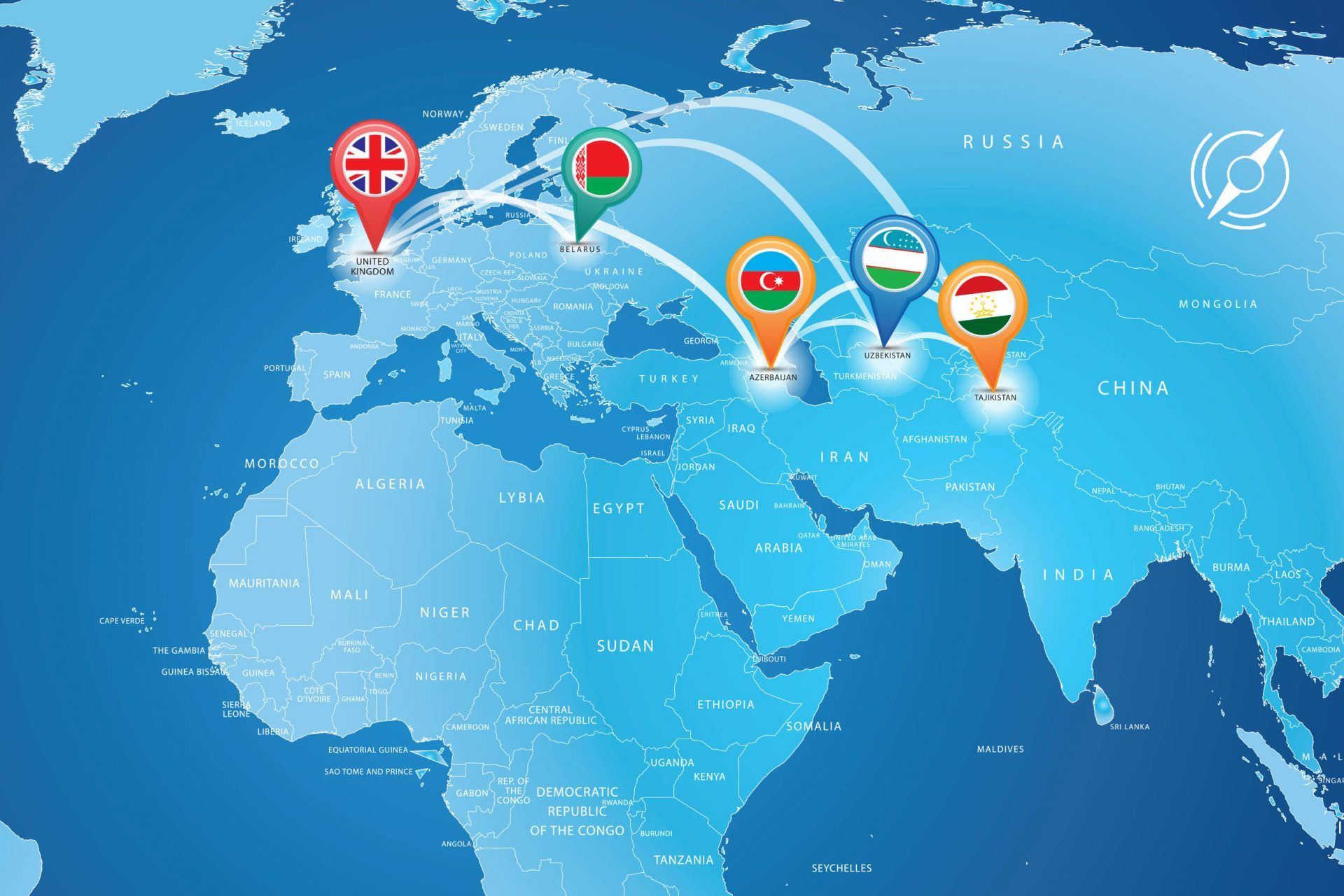2020 – 2021 Academic Year
Workshop ‘NATO’s withdrawal from Afghanistan: implications for Central Asia’ 27 May 2021
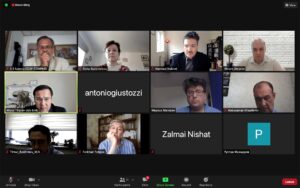 On 27 May 2021, the GCRF COMPASS led by the UWED team, together with the Embassy of Uzbekistan in the UK, organised a workshop titled ‘NATO’s withdrawal from Afghanistan: implications for Central Asia’. The US has started withdrawing troops from Afghanistan in May 2021, beginning the end of what President Joe Biden called “the forever war”. The NATO military forces and their allies are planning to conclude the withdrawal on the symbolic date of 11 September 2021. US President Joe Biden says the US pull-out is justified as US forces have made sure the country cannot again become a base for foreign jihadists to plot against the West. However, the current situation in Afghanistan is quite far from being stable: peace talks between Afghan government and the militants are stalled; the violence is widespread as the numbers of victims from both sides keep rising; international involvement is gradually drawing down and the prospects of conflict resolution are looming. In such circumstances, Central Asia as a neighbouring region is carefully observing the ongoing developments in Afghanistan. For many years after 1991, Central Asia perceived the situation in Afghanistan mainly from a security angle. But this approach was substantially reshaped starting from 2016 with active socio-economic partnership between Tashkent and Kabul. Therefore, considerable changes in Afghanistan can heavily impact Central Asia not only by increasing security challenges, but also disrupting the increasing volume of trade, economic and investment activities between the sides. The workshop addressed a number of issues 1) troops’ withdrawal – the implications; 2) prospects of continued US presence in the region; 3) future of peace talks; and 4) the role of regional countries. The speakers highlighted the ‘wicked’ nature of a problem that the country and the region face – whereby ‘both foreseen and unintended consequences of staying and leaving’ are significant. The programme of event is available here, for further information.
On 27 May 2021, the GCRF COMPASS led by the UWED team, together with the Embassy of Uzbekistan in the UK, organised a workshop titled ‘NATO’s withdrawal from Afghanistan: implications for Central Asia’. The US has started withdrawing troops from Afghanistan in May 2021, beginning the end of what President Joe Biden called “the forever war”. The NATO military forces and their allies are planning to conclude the withdrawal on the symbolic date of 11 September 2021. US President Joe Biden says the US pull-out is justified as US forces have made sure the country cannot again become a base for foreign jihadists to plot against the West. However, the current situation in Afghanistan is quite far from being stable: peace talks between Afghan government and the militants are stalled; the violence is widespread as the numbers of victims from both sides keep rising; international involvement is gradually drawing down and the prospects of conflict resolution are looming. In such circumstances, Central Asia as a neighbouring region is carefully observing the ongoing developments in Afghanistan. For many years after 1991, Central Asia perceived the situation in Afghanistan mainly from a security angle. But this approach was substantially reshaped starting from 2016 with active socio-economic partnership between Tashkent and Kabul. Therefore, considerable changes in Afghanistan can heavily impact Central Asia not only by increasing security challenges, but also disrupting the increasing volume of trade, economic and investment activities between the sides. The workshop addressed a number of issues 1) troops’ withdrawal – the implications; 2) prospects of continued US presence in the region; 3) future of peace talks; and 4) the role of regional countries. The speakers highlighted the ‘wicked’ nature of a problem that the country and the region face – whereby ‘both foreseen and unintended consequences of staying and leaving’ are significant. The programme of event is available here, for further information.
Dr Gerald Mako, Cambridge Central Asia Forum, Jesus College, University of Cambridge: ‘Illiberal Saviours: Alexei Navalny and Russia’s Millenia Old Siege Mentality’ on 21 May in the GCRF Cambridge Seminar Series.
Abstract: Portrayals of Alexei Navalny, the most well-known leader of the Russian opposition, tend to paint a black and white picture of him. In what can be broadly described as ‘Western’ media he is a champion of democracy who wages a crusade against Vladimir Putin’s corrupt-to-the-core regime while much of the Russian (and friendly) media is keen to prove that Navalny is an agent provocateur whose main goal is to spread chaos.
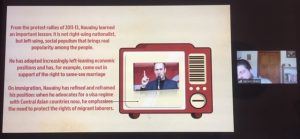 The truth, however, is likely to be found somewhere closer to the theoretical middle ground: Alexei Navalny is doubtlessly a champion of change in the Russian Federation, but his views cannot be described as liberal in the Western sense of the word. He is a staunch nationalist who wholeheartedly supports the annexation of the Crimea and is markedly anti(Central Asian)-migrant in his rhetoric. The talk will attempt to shed light on the evolution of Alexei Navalny’s views, their relation to the various contemporary intellectual/political streams in Russia while also discussing the deep historical roots of his views.
The truth, however, is likely to be found somewhere closer to the theoretical middle ground: Alexei Navalny is doubtlessly a champion of change in the Russian Federation, but his views cannot be described as liberal in the Western sense of the word. He is a staunch nationalist who wholeheartedly supports the annexation of the Crimea and is markedly anti(Central Asian)-migrant in his rhetoric. The talk will attempt to shed light on the evolution of Alexei Navalny’s views, their relation to the various contemporary intellectual/political streams in Russia while also discussing the deep historical roots of his views.
Biography: Dr Gerald Mako is a Research Affiliate of the Cambridge Central Asia Forum, Jesus College, University of Cambridge. His research interest span across disciplines, ranging from conversion to Islam in Central Asia to Soviet/Russian nation building and questions of identity to the future of energy in Central Asia, spread through a millennium in the space what can be described as the Eurasian steppe and its neighbouring regions and yielded more than three dozen articles to date. Aside from his academic work Gerald has worked extensively with international organizations like UNDP, Gates Foundation, WHO or the Commonwealth Secretariat, spearheaded cross-border educational initiatives supporting Syrian refugees and has been advising various governments on matters of sustainability, education and local governance.
‘Mongolian revolution of 1921 through the prism of 1989: the politics of “historical and cultural heritage” in socialist and post-socialist Mongolia’
On 19 May, Dr Saxena and Prajakti Kalra attended a talk organised by Mongolei-Colloquium with Dr. Irina Morozova (Lehrstuhl für Geschichte Südost- und Osteuropas, Universität Regensburg) on ‘Mongolian revolution of 1921 through the prism of 1989: the politics of “historical and cultural heritage” in socialist and post-socialist Mongolia’. Post-colonial discourse impacted Western-dominated approaches to socialist revolutions in Asia. Renaissance of vernacular responses to Western modernist ideas of progress marked the millennium turn in historiographies. In post-Cold War realities scholars referred to the revolutionary transformations in Mongolian steppes and mountains in the 1910-1920s, questing to rediscover independent Mongol state and “historical roots” of constitutional democracy. With this idea at the background, Mongolian historians accessed Soviet archives to rehabilitate Mongolian revolutionary heroes. Their Mongolian story of revolution started to have more political impact, also on Russian and Western historians. Based on Mongolian and Soviet
archival sources, private collections, as well as oral testomonies, this research reveals the facinating history of political activism at the end 1980s-beginning 1990s in the Mongolian Republic. The author focuses on competing concepts of development and social transformation set up by Mongolian politicians and intellectuals in their quest to reinterpret historical past and recreate Mongolian culture.
Biography: Irina Morozova is a historian, working on Inner and Central Asia. Her recent research interests involve comparative history and transregional Asian studies, global history and East-West communication and cultural exchange and economic history of Central Asia. She conducted research and taught at the Universities and research institutes in Germany, the Netherlands, Russia, Japan and Central Asian countries. Her most significant publications on the topic of the presentation include two monographs Socialist Revolutions in Asia: Social History of Mongolia in the Twentieth Century. (London and New York: Routledge, 2009); The Comintern and Revolution in Mongolia. (Cambridge: White Horse Press, 2002) and edited volume (in coeditorship with Boldbaatar, J.) The Legacies of Perestroika Discourses in Knowledge Production on Central Asia. (Ulaanbaatar: Ulaanbaatar University, 2013).
‘Korea-Eurasia ST&I Cooperation: Lessons and Prospects’: Cambridge talk by Dr Gill Won Suh
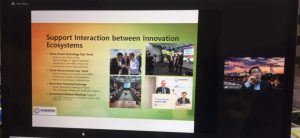 On 14 May, GCRF COMPASS Cambridge hosted Dr Gill Won Suh, Korea Russia Science and Technology Cooperation Center, South Korea, to give a talk on ‘Korea-Eurasia ST&I Cooperation: Lessons and Prospects’. Dr Suh gave a brief history of Korea-Eurasia relationships in the field of science and technology exchanges. He focused on the close cooperation between Russia and Korea and discussed the prospects of cooperation with Central Asia especially in the field of education and science.
On 14 May, GCRF COMPASS Cambridge hosted Dr Gill Won Suh, Korea Russia Science and Technology Cooperation Center, South Korea, to give a talk on ‘Korea-Eurasia ST&I Cooperation: Lessons and Prospects’. Dr Suh gave a brief history of Korea-Eurasia relationships in the field of science and technology exchanges. He focused on the close cooperation between Russia and Korea and discussed the prospects of cooperation with Central Asia especially in the field of education and science.
Globalisation and Order – Insights from the Middle Ages and Early Modern World: Centre for Geopolitics, University of Cambridge Panel on 12 May 2021
Prajakti Kalra gave a talk for the Centre for Geopolitics, University of Cambridge on 12 May 2021. The seminar series is aimed at providing historically-grounded solutions to enduring geopolitical problems. Part of the Institute for Historical Research Partnership Seminar Series ‘Applied History and Contemporary Geopolitics.’ The five-part series is convened by the Engelsberg Applied History Programme; the Centre for Grand Strategy at King’s College London; the Centre for Geopolitics at the University of Cambridge; and the Foreign, Commonwealth and Development Office Historians. This online seminar series represents a unique opportunity for historians interested in applying historical insight to contemporary questions in international affairs.
The panel entitled, Globalisation and Order – Insights from the Middle Ages and Early Modern World included Prajakti Kalra’s talk on ‘Globalisation 2.0: Mongol Eurasia to Modern Eurasia (EAEU and BRI)’ and talk 2. ‘From secession to the world: the early modern Dutch Republic as an example for post-Brexit Britain’ by Dr Bram De Ridder, Postdoctoral Researcher in Applied History, KU Leuven. The event was chaired by Gill Bennett OBE, Former Chief Historian, FCDO. The recording of the talk can be found here- https://www.youtube.com/watch?v=at_j9RCJbwg
Webinar ‘Belarus at a Crossroads: Lessons Learned on Social and Political Change’
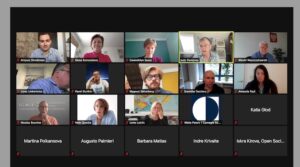 On 11 May 2021 Prof. Korosteleva and Dr Petrova participated in a closed webinar ‘Belarus at a Crossroads: Lessons Learned on Social and Political Change’ organised by Carnegie Europe. The speakers included Prof. Gwen Sasse, Director ZOIS, who presented a December 2020 survey on Belarus, and Artsiom Shraibman, Belarus’ political analyst, who talked about the EU measures to support change in the country – moderated by Judy Dempsey, Carnegie. The event involved politicians, analysts and academics.
On 11 May 2021 Prof. Korosteleva and Dr Petrova participated in a closed webinar ‘Belarus at a Crossroads: Lessons Learned on Social and Political Change’ organised by Carnegie Europe. The speakers included Prof. Gwen Sasse, Director ZOIS, who presented a December 2020 survey on Belarus, and Artsiom Shraibman, Belarus’ political analyst, who talked about the EU measures to support change in the country – moderated by Judy Dempsey, Carnegie. The event involved politicians, analysts and academics.
Webinar ‘Society and Revolution: Social Structure and Prospects of the Protest Movement in Belarus’, 6 May 2021
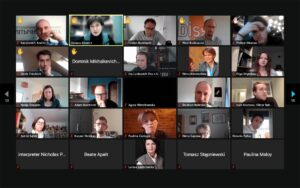 On 6 May 2021 Prof. Elena Korosteleva participated in a webinar ‘Society and Revolution: social Structure and prospects of the protest movement in Belarus’, organised by DRA German-Russian Exchange under the project ‘Network for Belarus’. The discussion focused on the role and levels of mobilisation of different categories of population in the country (especially its gender-dimension), and the sustainability of protests in light of the increasing state repression.
On 6 May 2021 Prof. Elena Korosteleva participated in a webinar ‘Society and Revolution: social Structure and prospects of the protest movement in Belarus’, organised by DRA German-Russian Exchange under the project ‘Network for Belarus’. The discussion focused on the role and levels of mobilisation of different categories of population in the country (especially its gender-dimension), and the sustainability of protests in light of the increasing state repression.
Panel Discussion on ‘Kazakhstan and Environmental Policy’, 6 May 2021
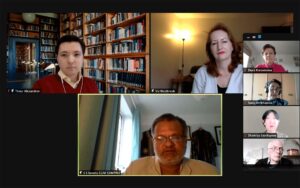 On 6 May 2021 GCRF COMPASS project, in cooperation with Cambridge Central Asia Forum and the Centre of Development Studies, University of Cambridge, and KIMEP University, Kazakhstan organised a Panel Discussion on ‘Kazakhstan and Environmental Policy’, chaired by Prof. Vivienne Westbrook (KIMEP University) and Dr Siddharth Saxena (Cambridge); and moderated by Dr Timur Alexandrov (Cambridge). The panellists included: Dr Zhamilya Utarbayeva (KIMEP) focusing on “Eco-activism and the Conservation of Protected Areas in Kazakhstan”; Dr JeongWon Bourdais Park (KIMEP) speaking about “Europe’s Policy Towards the Central Asian Environment in the Era of the Renewed Great Game”, and Dr Maria Baideldinova (KIMEP) “Wildlife Protection Legislation in Kazakhstan”. All three papers addressed current challenges and opportunities of domestic and international development in Kazakhstan. A link to recording will be available shortly.
On 6 May 2021 GCRF COMPASS project, in cooperation with Cambridge Central Asia Forum and the Centre of Development Studies, University of Cambridge, and KIMEP University, Kazakhstan organised a Panel Discussion on ‘Kazakhstan and Environmental Policy’, chaired by Prof. Vivienne Westbrook (KIMEP University) and Dr Siddharth Saxena (Cambridge); and moderated by Dr Timur Alexandrov (Cambridge). The panellists included: Dr Zhamilya Utarbayeva (KIMEP) focusing on “Eco-activism and the Conservation of Protected Areas in Kazakhstan”; Dr JeongWon Bourdais Park (KIMEP) speaking about “Europe’s Policy Towards the Central Asian Environment in the Era of the Renewed Great Game”, and Dr Maria Baideldinova (KIMEP) “Wildlife Protection Legislation in Kazakhstan”. All three papers addressed current challenges and opportunities of domestic and international development in Kazakhstan. A link to recording will be available shortly.
Webinar ‘Central Asia at 30: The Long Road to Reform’, Chatham House, 27 April 2021
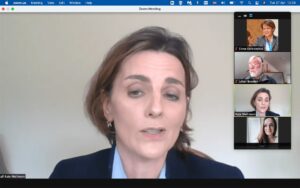 On 27 April 2021, Professor Elena Korosteleva and Dr Irina Petrova participated in a webinar ‘Central Asia at 30: the long road to reform’ organised by Chatham House. The webinar explored the state of play in Central Asia, thirty years after the collapse of the Soviet Union. Participants included Aziza Umarova, CEO SmartGov Consulting; Julian Bowden, Oxford Institute for Energy Studies and Kassymkhan Kapparov, Founder Ekomist.kz, moderated by Kate Mallinson, Russia and Eurasia Programme, Chatham House. All speakers noted a gradual rise of the region, especially economically and in global connectivity. However, the challenges ahead include countries’ dependency on their undiversified supply sector, which could lead to a deficit in the future, consequences of COVID-19 and rising presence of China in the region, which could become a proxy of the latter.
On 27 April 2021, Professor Elena Korosteleva and Dr Irina Petrova participated in a webinar ‘Central Asia at 30: the long road to reform’ organised by Chatham House. The webinar explored the state of play in Central Asia, thirty years after the collapse of the Soviet Union. Participants included Aziza Umarova, CEO SmartGov Consulting; Julian Bowden, Oxford Institute for Energy Studies and Kassymkhan Kapparov, Founder Ekomist.kz, moderated by Kate Mallinson, Russia and Eurasia Programme, Chatham House. All speakers noted a gradual rise of the region, especially economically and in global connectivity. However, the challenges ahead include countries’ dependency on their undiversified supply sector, which could lead to a deficit in the future, consequences of COVID-19 and rising presence of China in the region, which could become a proxy of the latter.
GCRF COMPASS, Cambridge Central Asia Forum and Centre for Development Studies – Novruz talk by Professor Ambassador Hasan Hasanov of Azerbaijan
On 23 April 2021, GCRF COMPASS together with the Centre for Development Studies and Cambridge Central Asia Forum, Jesus College hosted Professor Ambassador Hasan Hasanov of Azerbaijan, who spoke about the historic traditions of Novruz, and its salience for the wider Eurasian region.
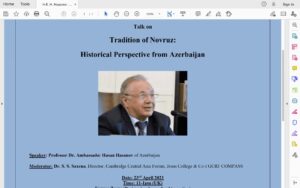
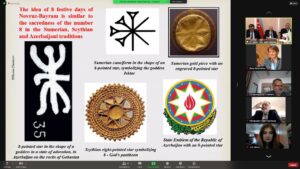
Participants learned about the origin, the rituals, traditions and the meaning of Novruz, and how it drew people together from wider neighbourhoods to celebrate the beginning of life and spring.
Virtual Workshop ‘Shifting geopolitics of the South caucasus after the Nagorno-Karabakh War’, 22 December 2020
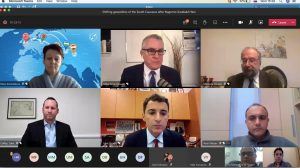 On 22 December 2020 ADA University has organised a virtual workshop ’Shifting geopolitics of the South caucasus after the Nagorno-Karabakh War’. In late September 2020, three decades long Nagorno-Karabakh conflict went into the most violent phase since 1994. Azerbaijan and Armenia were able to reach a new cease-fire agreement through the unilateral mediation of Russia. How long will the peace agreement last, and what are the consequences of the new geopolitics? What is the role for the EU and other international players? The workshop included presentations from local and international experts, policy-makers and practitioners. The full programme is available here
On 22 December 2020 ADA University has organised a virtual workshop ’Shifting geopolitics of the South caucasus after the Nagorno-Karabakh War’. In late September 2020, three decades long Nagorno-Karabakh conflict went into the most violent phase since 1994. Azerbaijan and Armenia were able to reach a new cease-fire agreement through the unilateral mediation of Russia. How long will the peace agreement last, and what are the consequences of the new geopolitics? What is the role for the EU and other international players? The workshop included presentations from local and international experts, policy-makers and practitioners. The full programme is available here
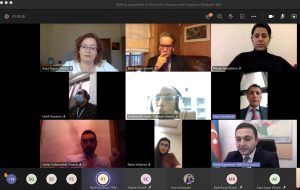
Eurasian network of regional initiatives and organisations: element of connectivity’, 29 October 2020
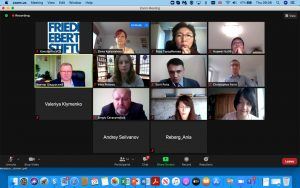 At the initiative of Professor Roza Turarbekova, Belarusian State University, conjointly with the COMPASS project and Friedrich Ebert Stiftung, organised an international roundtable on the theme of ‘Eurasian network of regional initiatives and organisations’, on 29 October 2020. The roundtable discussed the issues and challenges of Eurasian integration and the role of core organisations and regional players and initiatives in strengthening or wearing this process, especially in the circumstances of ongoing regional transformations, and global economic and health crises. The workshop was opened by Professor Elena Korosteleva (Kent), Professor Victor Shadurski (BSU) and Christopher Forst (FE Stiftung), and consisted of two sessions, moderated by Professor Roza Turarbekova, and Professor Elena Korosteleva. From Kent the speakers included Dr Irina Petrova and Huawei Zheng, who delivered his presentation in Russian! Full programme is available here.
At the initiative of Professor Roza Turarbekova, Belarusian State University, conjointly with the COMPASS project and Friedrich Ebert Stiftung, organised an international roundtable on the theme of ‘Eurasian network of regional initiatives and organisations’, on 29 October 2020. The roundtable discussed the issues and challenges of Eurasian integration and the role of core organisations and regional players and initiatives in strengthening or wearing this process, especially in the circumstances of ongoing regional transformations, and global economic and health crises. The workshop was opened by Professor Elena Korosteleva (Kent), Professor Victor Shadurski (BSU) and Christopher Forst (FE Stiftung), and consisted of two sessions, moderated by Professor Roza Turarbekova, and Professor Elena Korosteleva. From Kent the speakers included Dr Irina Petrova and Huawei Zheng, who delivered his presentation in Russian! Full programme is available here.
Minos Gent – Belarus: Where is the EU? – Research Webinar, 20 October 2020
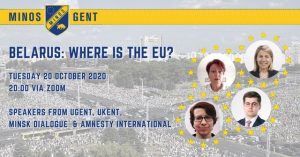 The students of Ghent University invited Professor Fabienne Bossuyt (Ghent, and COMPASS AB member), Professor Elena Korosteleva (Kent and COMPASS PI), Yauheni Preiherman (BSU COMPASS and Minsk Dialogue Initiative) and Dr Nadzeya Husakouskaya (Amnesty International London), to discuss change in Belarus and the EU response. The two-hour webinar involved 40 participants with an in-depth Q&A and a short presentation from every speaker. The full programme is available here.
The students of Ghent University invited Professor Fabienne Bossuyt (Ghent, and COMPASS AB member), Professor Elena Korosteleva (Kent and COMPASS PI), Yauheni Preiherman (BSU COMPASS and Minsk Dialogue Initiative) and Dr Nadzeya Husakouskaya (Amnesty International London), to discuss change in Belarus and the EU response. The two-hour webinar involved 40 participants with an in-depth Q&A and a short presentation from every speaker. The full programme is available here.
2019 – 2020 Academic Year
COMPASS Work-in-progress seminar ‘Hamsoya – united in shadows: the making of resilient communities in Wider Eurasia’, 16 July 2020
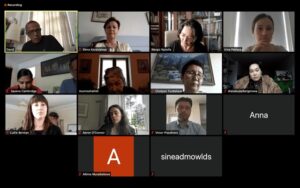 On 16 July 2020 COMPASS held a Work-in-progress seminar ‘Hamsoya – united in shadows: the making of resilient communities in Wider Eurasia’, following two workshops on 23-24 April and 18 June. In the first presentation, Professor David Chandler (University of Westminster) discussed his paper ‘Becoming Resilient: The ‘Right to Opacity’ as the Foundation of ‘Relations of Community’. The presentation outlined different conceptualisations of resilience and suggested an alternative understanding, drawing on the perspectives of the Anthropocene and poetics. The second presentation by Professor Nargis Nurulla-Khodzhaeva (Moscow State University) ‘Bouncing Back: the Value of Glocal Resilience and Sufi-Hamsoya’ explored the philosophical underpinnings of Sufism and pinpointed the principles of good neighbourliness as the background for resilience of Central Asian communities. Both presentations and the in-depth discussion contributed to the elaboration of an innovative understanding of resilience.
On 16 July 2020 COMPASS held a Work-in-progress seminar ‘Hamsoya – united in shadows: the making of resilient communities in Wider Eurasia’, following two workshops on 23-24 April and 18 June. In the first presentation, Professor David Chandler (University of Westminster) discussed his paper ‘Becoming Resilient: The ‘Right to Opacity’ as the Foundation of ‘Relations of Community’. The presentation outlined different conceptualisations of resilience and suggested an alternative understanding, drawing on the perspectives of the Anthropocene and poetics. The second presentation by Professor Nargis Nurulla-Khodzhaeva (Moscow State University) ‘Bouncing Back: the Value of Glocal Resilience and Sufi-Hamsoya’ explored the philosophical underpinnings of Sufism and pinpointed the principles of good neighbourliness as the background for resilience of Central Asian communities. Both presentations and the in-depth discussion contributed to the elaboration of an innovative understanding of resilience.
Second COMPASS Special Issue Workshop ‘Hamsoya – united in shadows: the making of resilient communities in Wider Eurasia’, 18 June 2020
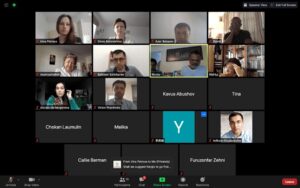 The 2nd COMPASS Special Issue Workshop “Hamsoya – united in shadow: The making of resilient communities in Central Eurasia” took place on 18 June 2020. Following the 1st workshop organised on 23-24 April 2020, contributions to the Special Issue presented their elaborated draft articles. The discussion was facilitated by the GCRF COMPASS members from all participating universities, as well as by external researchers – top-level experts in their respective fields of knowledge: Professors David Chandler (Westminster University); Andrea Gawrich (JLU Giessen); Magnus Marsden (University of Sussex); Fabienne Bossuyt (Ghent University) and Grigory Ioffe (Radford University). The workshop aimed to explore the making of resilient communities in Central Eurasia, both conceptually – by looking anew at the meanings of resilience, hamsoya, identity, ‘good life’, and ‘peoplehood’; and empirically – by drawing on unique first-hand evidence from focus groups across the region. The workshop aimed to develop synergies between the western and eastern ways of thinking, and take our understanding of community, change, governance and resilience to a new level. Special thanks goes to Dr Irina Petrova for organising the workshop.
The 2nd COMPASS Special Issue Workshop “Hamsoya – united in shadow: The making of resilient communities in Central Eurasia” took place on 18 June 2020. Following the 1st workshop organised on 23-24 April 2020, contributions to the Special Issue presented their elaborated draft articles. The discussion was facilitated by the GCRF COMPASS members from all participating universities, as well as by external researchers – top-level experts in their respective fields of knowledge: Professors David Chandler (Westminster University); Andrea Gawrich (JLU Giessen); Magnus Marsden (University of Sussex); Fabienne Bossuyt (Ghent University) and Grigory Ioffe (Radford University). The workshop aimed to explore the making of resilient communities in Central Eurasia, both conceptually – by looking anew at the meanings of resilience, hamsoya, identity, ‘good life’, and ‘peoplehood’; and empirically – by drawing on unique first-hand evidence from focus groups across the region. The workshop aimed to develop synergies between the western and eastern ways of thinking, and take our understanding of community, change, governance and resilience to a new level. Special thanks goes to Dr Irina Petrova for organising the workshop.
The programme of the workshop is available here.
COMPASS Virtual Workshop ‘Hamsoya – united in shadows: The making of resilient communities in Central Eurasia’, 23 – 24 April 2020
On 23-24 April 2020 the GCRF COMPASS team involved in the preparation of the COMPASS Special Issue held a virtual workshop titled “Hamsoya – united in shadows’: The making of resilient communities in Central Eurasia’. The workshop aimed at developing an innovative approach to resilience as self-governance through an in-depth analysis of the local communities in Central Eurasia spanning Belarus in the west, Azerbaijan in the south and Tajikistan in the East. The discussion benefited from the contributions by all GCRF COMPASS partner institutions, as well as some members of the Advisory Board.
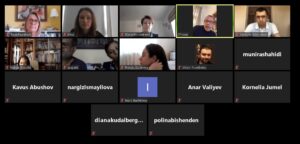
The first day was devoted to the discussion of conceptual framework, examining the role of change, identity, ‘good life’ and ‘peoplehood’ in engendering communities’ resilience. Such ideas as ‘Westfullness and Westlessness’, ‘right to opacity’, ‘Sufi-Hamsoya’ and poetics of Central Asia provided important critical insights to the debate. The second day zoomed in to the empirical studies of the local resilient communities of Azerbaijan, Belarus, Uzbekistan and Tajikistan. Building on the primary data collected through focus groups, partners presented their first analysis of the extensive COMPASS database. The follow-up workshop is scheduled to take place in June 2020.
The programme of the workshop is available here.
Online Forum ‘The Pandemic Disruptor: COVID-19’s implications for East European security’ , 7 April 2020 12:00 – 13:15 Uk time
The forum was organised conjointly by Minsk Dialogue Council on International Relations (Belarus), Konrad-Adenauer-Stiftung (Germany), Eastern Europe Studies Centre (Lithuania), Centre for Eurasian and European Studies at the Faculty of International Relations, Belarusian State University (Belarus), and GCRF COMPASS Project (UK).
The forum discussed the implications of the COVID-19 pandemic for the security of wider Europe, and possible measures to mitigate them. Professor Korosteleva outlined five specific concerns that may have an impact on the current status quo, including 1) the return of the state; 2) the prospect of economic recession; 3) the return of borders and breakdown of European solidarity; 4) double-edge globalisation effect on developing countries in the region; and 5) the alleged ‘death of resilience’ requiring more central control. The programme is available, and the discussion could be viewed here, on the Minsk Dialogue’s You Tube Channel.
Pre-Launch UKRI/GCRF Conflict Intersections Funding Call Event, 28-29 January 2020, Bishkek
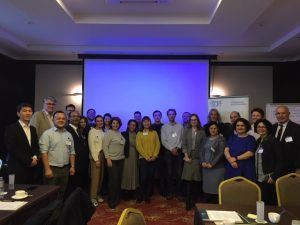
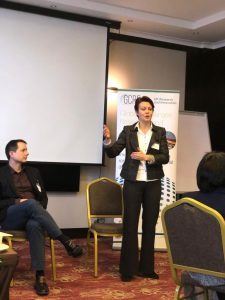 GCRF challenge leader Dr Neelam Rainer and her team organised a research workshop for UK and regional scholars to discuss research opportunities under the forthcoming call, and offer training for developing research applications with a focus on conflict intersections. The workshop involved presentations from successful GCRF projects, including Dr Chuck Thiessen (Coventry), Dr Troy Sternberg (Oxford) and Professor Elena Korosteleva (Kent), and skills development session for over 40 regional and policy participants, including COMPASS representatives – from Kent, Cambridge, ADA University, BSU, TNU, UWED and ERI in Kazakhstan – regional scholars and FCO & DFID officials. At the end of 1.5 day research-intense sessions, regional scholars developed an outline of their respective projects for further collaboration with UK universities, with a focus on conflict intersections.
GCRF challenge leader Dr Neelam Rainer and her team organised a research workshop for UK and regional scholars to discuss research opportunities under the forthcoming call, and offer training for developing research applications with a focus on conflict intersections. The workshop involved presentations from successful GCRF projects, including Dr Chuck Thiessen (Coventry), Dr Troy Sternberg (Oxford) and Professor Elena Korosteleva (Kent), and skills development session for over 40 regional and policy participants, including COMPASS representatives – from Kent, Cambridge, ADA University, BSU, TNU, UWED and ERI in Kazakhstan – regional scholars and FCO & DFID officials. At the end of 1.5 day research-intense sessions, regional scholars developed an outline of their respective projects for further collaboration with UK universities, with a focus on conflict intersections. 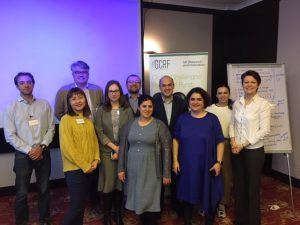
2018 – 2019 Academic Year
COMPASS Research Workshops 2018 – 2019
COMPASS partners organised four research workshops during the past academic year discussing topics ranging from ‘EU and resilience’ to the ‘Belt and Road Initiative @ Five’ and ‘Sustainable Future’ and ‘Good Governance’. The workshops were held in Italy, the UK and Uzbekistan and attracted young researchers not only from the partners involved in the project but also from outside, providing excellent opportunities for collaboration and networking.
International Workshop: ‘Sustainable Future and Good Governance: Conceptual Approaches’, 15 June 2019, Tashkent
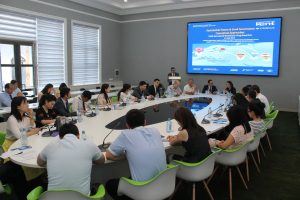 On June 15, 2019, a scientific and practical workshop for young researchers on the topic “Sustainable Future and Good Governance: Conceptual Approaches” was held at the University of World Economy and Diplomacy. The workshop was organized by the GCRF COMPASS (Comprehensive Capacity-Building in the Eastern Neighbourhood and Central Asia: research integration, impact governance & sustainable communities) international academic project.
On June 15, 2019, a scientific and practical workshop for young researchers on the topic “Sustainable Future and Good Governance: Conceptual Approaches” was held at the University of World Economy and Diplomacy. The workshop was organized by the GCRF COMPASS (Comprehensive Capacity-Building in the Eastern Neighbourhood and Central Asia: research integration, impact governance & sustainable communities) international academic project.
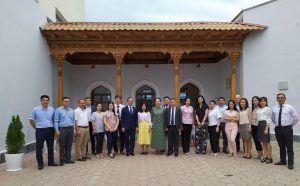 More than 30 young researchers from Cambridge and Sussex universities (UK), Tajik National University (Tajikistan), University of World Economy and Diplomacy (Uzbekistan) participated in the workshop. Director of the Centre for Analysis and Forecasting under the Ministry of Foreign Affairs of the Republic of Uzbekistan, Ambassador Dr Doniyor Kurbanov gave a keynote speech on the new foreign policy strategy of the country and its positive influence on the sustainable development.
More than 30 young researchers from Cambridge and Sussex universities (UK), Tajik National University (Tajikistan), University of World Economy and Diplomacy (Uzbekistan) participated in the workshop. Director of the Centre for Analysis and Forecasting under the Ministry of Foreign Affairs of the Republic of Uzbekistan, Ambassador Dr Doniyor Kurbanov gave a keynote speech on the new foreign policy strategy of the country and its positive influence on the sustainable development.
The papers were presented in the following panels:
- Conceptual approaches to sustainable development and governance;
- Development trajectories and stability (case-studies);
- Sustainable development and cooperation in Central Asia.
The workshop participants discussed the theoretical aspects of sustainable development and good governance, models of political and economic reforms of developed and developing countries in Europe, East and Southeast Asia, as well as regional geopolitics in Central Asia and its impact on large-scale reforms in Uzbekistan.
GCRF COMPASS workshop ‘ The Belt and Road Initiative @ Five: Taking stock of global ambitions, regional response, and looking ahead’ 13 – 15 March 2019, Canterbury and Cambridge
Between 13th and 15th of March the COMPASS Cambridge and Kent teams organised a joint event on the Belt and Road Initiative (BRI).

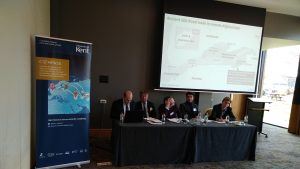 First, on 13th March a one-day workshop took place at the University of Kent, Canterbury. The workshop brought together scholars working on recent developments regarding China’s BRI and the regional responses from Eastern Europe and Central Asia to China’s growing investments. The workshop hosted three panels, on China’s grand strategy and its visions for international order; and on regional responses to the BRI, focusing particularly on the Eastern neighbourhood and Central Asia.
First, on 13th March a one-day workshop took place at the University of Kent, Canterbury. The workshop brought together scholars working on recent developments regarding China’s BRI and the regional responses from Eastern Europe and Central Asia to China’s growing investments. The workshop hosted three panels, on China’s grand strategy and its visions for international order; and on regional responses to the BRI, focusing particularly on the Eastern neighbourhood and Central Asia.
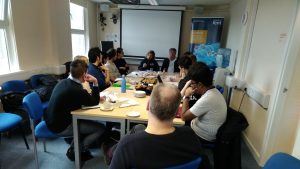 The workshop was followed by a Master Class on 14th March where postgraduate students at the University of Kent took the opportunity to ask questions about the BRI to the experts participating in the workshop: Professor Aleksandr Baichorov (BSU), Professor Kerry Brown (KCL), Dr Olivia Cheung (University of Warwick), and Dr Alice Ekman (IFRI). Students asked questions about the impact of the BRI on relations with Europe and the USA, the economic and security implications of the BRI and the legal context of these developments.
The workshop was followed by a Master Class on 14th March where postgraduate students at the University of Kent took the opportunity to ask questions about the BRI to the experts participating in the workshop: Professor Aleksandr Baichorov (BSU), Professor Kerry Brown (KCL), Dr Olivia Cheung (University of Warwick), and Dr Alice Ekman (IFRI). Students asked questions about the impact of the BRI on relations with Europe and the USA, the economic and security implications of the BRI and the legal context of these developments.
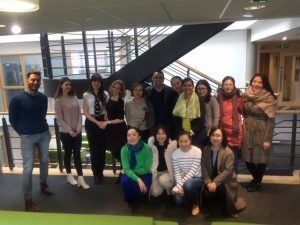 On 15th March a workshop on the BRI was organised by the Cambridge Central Asia Forum. Eleven scholars from the University of Cambridge, BSU, UCL and Kent presented their work on the historic Silk Road and contemporary issues, from various disciplinary angels, including anthropology, archaeology, political economy and international relations. The presentations were followed by a discussion session and a joint lunch. COMPASS affiliates from ADA University, BSU and Kent also participated in this event.
On 15th March a workshop on the BRI was organised by the Cambridge Central Asia Forum. Eleven scholars from the University of Cambridge, BSU, UCL and Kent presented their work on the historic Silk Road and contemporary issues, from various disciplinary angels, including anthropology, archaeology, political economy and international relations. The presentations were followed by a discussion session and a joint lunch. COMPASS affiliates from ADA University, BSU and Kent also participated in this event.
The full programme is available and workshop presentations will be published in form of proceedings.
Roundtable on Dynamics and Dynamisms of the Emerging Global Order, 8 March 2019,
Cambridge
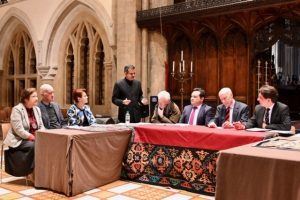 CCAF in collaboration with GCRF COMPASS and Centre of Development Studies organised a Strategic Ambassadorial meeting on 8 March 2019. The panel consisted of HE Jawad (Ambassador of Afghanistan), HE Khalifzoda (Ambassador of Tajikistan), HE Shaykhov (Ambassador of Uzbekistan), Mr Annayev (Embassy of Turkmenistan), and Mr Sydykov (Embassy of Kyrgyz Republic). Senior Cambridge academics like Prof Lord Mair, Prof Nolan and Mr Ray were also part of the panel with Prof Shahidi (TNU) and Prof Korosteleva (Uni of Kent, PI GCRF COMPASS). The meeting was chaired by Dr Saxena and attended by students, early career researchers and colleagues from University of Cambridge. The roundtable was followed by a cultural evening to celebrate Navroz (Central Asian New Year). The discussion highlighted major initiatives on Economic Development, Good Governance, Industrial Development, Technical and Human Capacity Building, Culture and Education underway in the spirit of regional connectivity. Particular highlights included the increasing role of Central Asian neighbours in rebuilding Afghanistan and overall regional connectivity and cooperation after 25 years of impasse.
CCAF in collaboration with GCRF COMPASS and Centre of Development Studies organised a Strategic Ambassadorial meeting on 8 March 2019. The panel consisted of HE Jawad (Ambassador of Afghanistan), HE Khalifzoda (Ambassador of Tajikistan), HE Shaykhov (Ambassador of Uzbekistan), Mr Annayev (Embassy of Turkmenistan), and Mr Sydykov (Embassy of Kyrgyz Republic). Senior Cambridge academics like Prof Lord Mair, Prof Nolan and Mr Ray were also part of the panel with Prof Shahidi (TNU) and Prof Korosteleva (Uni of Kent, PI GCRF COMPASS). The meeting was chaired by Dr Saxena and attended by students, early career researchers and colleagues from University of Cambridge. The roundtable was followed by a cultural evening to celebrate Navroz (Central Asian New Year). The discussion highlighted major initiatives on Economic Development, Good Governance, Industrial Development, Technical and Human Capacity Building, Culture and Education underway in the spirit of regional connectivity. Particular highlights included the increasing role of Central Asian neighbours in rebuilding Afghanistan and overall regional connectivity and cooperation after 25 years of impasse.
Workshop ‘Russia between East and West, and the Future of Eurasian Order’, 13 December 2018, London
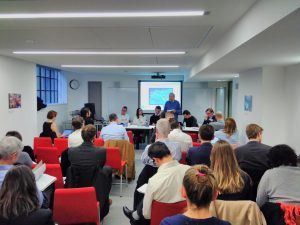 On 13th December 2018 the GCRF COMPASS and H2020 UPTAKE projects organised a workshop at the LSE IDEAS in London. The workshop, titled ‘Russia between East and West and the Future of Eurasian Order’ brought together over forty international participants from the COMPASS project, external universities and research institutes, and relevant Embassies, to examine Russia’s external governance and the wider Eurasian region’s response. The workshop was organised by PI Prof Elena Korosteleva and Zachary Paikin (COMPASS affiliate, University of Kent). The event addressed issues of challenges and opportunities for cooperative orders in the wider Eurasia; dynamics of Russia’s engagement in the region; the role of the Eurasian Economic Union and the shared neighbourhood of Russia and the European Union. As a result of the workshop discussions, the organising team will be developing a Special Issue with contributions from COMPASS and external participants. The workshop’s programme and speaker information can be found here
On 13th December 2018 the GCRF COMPASS and H2020 UPTAKE projects organised a workshop at the LSE IDEAS in London. The workshop, titled ‘Russia between East and West and the Future of Eurasian Order’ brought together over forty international participants from the COMPASS project, external universities and research institutes, and relevant Embassies, to examine Russia’s external governance and the wider Eurasian region’s response. The workshop was organised by PI Prof Elena Korosteleva and Zachary Paikin (COMPASS affiliate, University of Kent). The event addressed issues of challenges and opportunities for cooperative orders in the wider Eurasia; dynamics of Russia’s engagement in the region; the role of the Eurasian Economic Union and the shared neighbourhood of Russia and the European Union. As a result of the workshop discussions, the organising team will be developing a Special Issue with contributions from COMPASS and external participants. The workshop’s programme and speaker information can be found here
Workshop ‘The EU and resilience: interrogating theory, policies and practice’, 9 November 2018, Rome
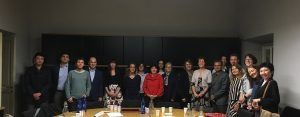 On 9th November, the GCRF-COMPASS and H2020 UPTAKE projects organised a workshop in Rome, hosted by Istituto Affari Internazionali (IAI). The workshop, titled “The EU and resilience: interrogating theory, policies and practice” brought together over forty participants to reflect on the concept of resilience and its application in the EU’s policies towards the eastern neighbourhood and Central Asia. The team is now working on a Special Issue titled ‘The EU and Resilience: from the global to the local, in theory and practice’.
On 9th November, the GCRF-COMPASS and H2020 UPTAKE projects organised a workshop in Rome, hosted by Istituto Affari Internazionali (IAI). The workshop, titled “The EU and resilience: interrogating theory, policies and practice” brought together over forty participants to reflect on the concept of resilience and its application in the EU’s policies towards the eastern neighbourhood and Central Asia. The team is now working on a Special Issue titled ‘The EU and Resilience: from the global to the local, in theory and practice’.
Information about the event can be found here
